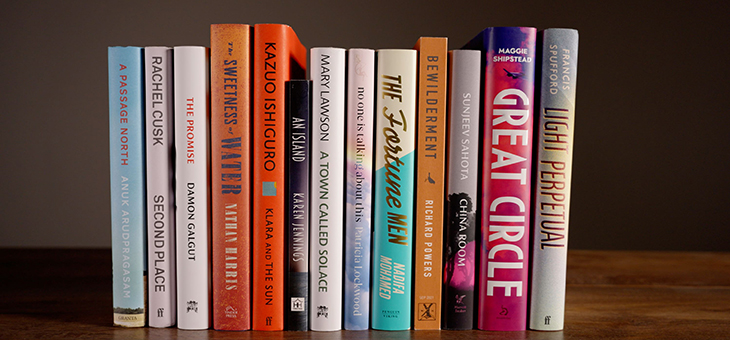This year’s panel – chaired by historian Maya Jasanoff and featuring former archbishop of Canterbury Rowan Williams – managed to whittle down 158 novels to a list of just 13.
Ms Jasanoff said: “One thing that unites these books is their power to absorb the reader in an unusual story, and to do so in an artful, distinctive voice. Many of them consider how people grapple with the past – whether personal experiences of grief or dislocation, or the historical legacies of enslavement, apartheid and civil war.
“Many examine intimate relationships placed under stress, and through them meditate on ideas of freedom and obligation, or on what makes us human. It’s particularly resonant during the pandemic to note that all of these books have important things to say about the nature of community, from the tiny and secluded to the unmeasurable expanse of cyberspace.”
Read: Dazzling debut novels from fresh new writers
Douglas Stuart took home the top prize in 2020 for his debut Shuggie Bain, a harrowing tale of poverty and addiction in 1980s Glasgow.
A shortlist of six books will be announced on 14 September, with the ultimate winner crowned on 3 November.
If you’re looking for a new read, these are our top picks from the longlist.
1. Klara And The Sun by Kazuo Ishiguro
Kazuo Ishiguro is familiar with the Booker Prize: he won it in 1989 for The Remains Of The Day, and has been shortlisted three other times.
Sir Kazuo is a top contender for this year’s award. Klara And The Sun has been sweeping bestseller lists, and is his first book since winning the Nobel Prize in 2017.
It tells the story of an Artificial Friend called Klara. She lives in a store waiting to be bought as a companion, all the while the humans are passing by. It picks up similar themes to some of Ishiguro’s previous books – robots, cloning, love and what it means to be human – making for a truly beautiful read.
2. No One Is Talking About This by Patricia Lockwood
Poet Patricia Lockwood shot to fame with her 2017 memoir Priestdaddy – the darkly comic, bizarre and unputdownable story of her life growing up with a gun-toting, rock music-loving Catholic priest for a father.
Read: Our top picks from the Women’s Prize for Fiction longlist
No One Is Talking About This is her first novel, and it’s just as hard to define. It features a nameless protagonist who is a social media sensation – she constantly goes viral on ‘the portal’, a platform similar to Twitter. Suddenly, she has to tear herself away from her online life when her mother asks her to come home. Ms Lockwood’s style is unique and fragmentary, and she manages to explore topics such as social media, addiction and relationships like no other.
3. A Town Called Solace by Mary Lawson
This isn’t Mary Lawson’s first time on the Booker Prize longlist: she was previously nominated for her 2006 novel The Other Side Of The Bridge.
For A Town Called Solace, Ms Lawson goes back to her native Canada, with the action set in 1970s Northern Ontario. She cleverly intertwines the stories of eight-year-old Clara, the elderly neighbour Elizabeth and newly divorced Liam into a book showing the drama, joy and heartbreak of everyday life.
Mary Lawson was in her 50s when she published her first novel, and is now longlisted for the Booker Prize in her 70s.
4. The Fortune Men by Nadifa Mohamed
The Fortune Men is British Somali author Nadifa Mohamed’s third novel. She sets the action in Cardiff’s Tiger Bay in 1952, a portside area known for being a melting pot of different cultures.
Ms Mohamed novelises the real story of Mahmood Mattan, a Somali seaman who was wrongfully arrested for the murder of a local shopkeeper. Like Mahmood, the reader soon realises innocence might not be enough to save him from a death sentence.
It’s a searing and moving look at institutional racism and the helplessness you can feel in the face of prejudice.
5. Second Place by Rachel Cusk
Rachel Cusk’s work is certainly an acquired taste; those who have read any of her Outline trilogy will either love or hate her style.
Ms Cusk often flouts literary convention with her stories, and Second Place flows with her signature style. The narrator is M, an insecure 50-year-old, who invites a famous artist to stay with her and her husband. With the pandemic in the background, Ms Cusk uses Second Place as an opportunity to explore the value of art in society – as well as the place of both men and women.
Read: Big books to get lost in
The full 2021 longlist:
A Passage North by Anuk Arudpragasam
Second Place by Rachel Cusk
The Promise by Damon Galgut
The Sweetness Of Water by Nathan Harris
Klara And The Sun by Kazuo Ishiguro
An Island by Karen Jennings
A Town Called Solace by Mary Lawson
No One Is Talking About This by Patricia Lockwood
The Fortune Men by Nadifa Mohamed
Bewilderment by Richard Powers
China Room by Sunjeev Sahota
Great Circle by Maggie Shipstead
Light Perpetual by Francis Spufford
Have you read any of these? Which one are you most excited to read? Why not share your favourite book in the comments section below?
– With PA
If you enjoy our content, don’t keep it to yourself. Share our free eNews with your friends and encourage them to sign up.

